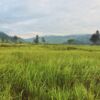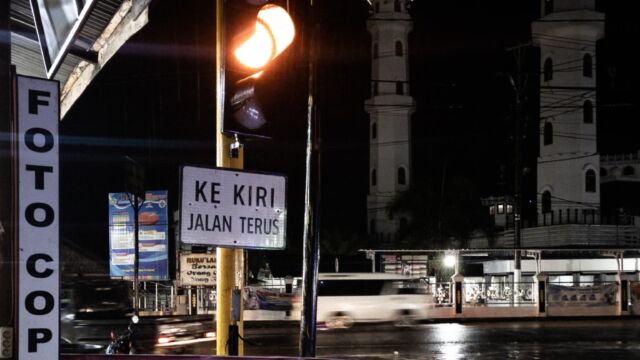The Case for Dating at a Reservoir
Photo: Arman Dhani
Tambakboyo reservoir | 2,000 words
Translated from Bahasa Indonesia by Lise Isles
‘So, I had a Tinder date in this place. We had a chat, then were forced to take shelter when it rained. Had coffee at that café close to the water.’
Fira walks fast. Wearing a blue shirt and a purple mask, she shows no signs of tiredness, even though she’s already walked over three kilometres. Tambakboyo this morning is clear and bright. Entering the reservoir from the downwards-sloping path on its west side reveals an enormous pool of reflected silver water. From a distance the trash isn’t yet visible. Like so many public spaces in Yogyakarta or ‘Yogya’, it looks perfect until you see it up close.
The fresh air around Tambakboyo makes it like an oasis. From the path that wraps around its shoreline, the mountain to the north can be seen clearly. Mount Merapi stands tall, like an enormous milepost. It’s so often visible in Yogya that it’s used to indicate direction.
‘How long did you talk for? And what happened?’ I ask.
‘We talked for quite a long time. Afterwards, he stopped contacting me. Ghosting – the usual’. Fira’s tone is flat. Apparently unbothered, she continues to walk, overtaking two or three people whose pace is slow.
‘Hold on a sec’, I say, out of breath. ‘You’re too fast’.
*
I choose to come to Tambakboyo reservoir because of all the open space. If you arrive early, and are lucky enough for it to have rained the night before, the sky will be a piercing blue, while Merapi will appear so clearly its peak will be reflected on the surface of the water.
I got to know Fira on Bumble. She was the first woman I talked to via a dating app since I broke up with my ex two years ago. Our conversation got pretty deep: we found ourselves discussing a lot of things. From past trauma, to our respective experiences meeting potential partners, to recommendations on good places to eat. Fira always talks fast. She doesn’t like it if people look at her face for too long.
My friends always tell me that Tambakboyo is a weird place to meet up with people.
‘You do know, right, that most people, if they’re meeting like a Bumble date or a Tinder date, they’ll take them to Mediterranea or at least some nice café lah in Yogya’, my friend Sekar told me. ‘You take them to a reservoir!’
‘But Tambakboyo surprises people’, I responded. ‘People don’t have expectations. Everyone I invite to Tambakboyo always has a good time’.
She really knows every corner of this place, all its inhabitants and all its routine visitors.
At this, Sekar’s eyes nearly popped out of his head. He couldn’t believe I had invited more than one person I’d met on a dating app to a reservoir.
‘It’s cheap and it helps me to get fit’, I added.
I don’t have all that much money. Mediterranea, the restaurant Sekar recommended, costs way more than Yogyakarta’s minimum wage. To eat there once might compel me to fast for two weeks. Going to Mediterranea would help build up an impression of me as a man of culture, a man of means, a man of sophisticated tastes. Characteristics I do not possess.
Sekar continued to needle: why would I meet up with girls at Tambakboyo? While the place has an undeniable beauty, the path isn’t flat, and almost every day there are big puddles everywhere, even when it isn’t rainy season. Walkers doing a circuit of the basin often come close to colliding with motorbikes swerving to avoid the puddles. The path around the basin isn’t wide, it will only fit a single car, yet several times I’ve seen people using the track as a place to learn to drive: despite cars and motorbikes both being banned, some still disobey. The young people who hang out along the reservoir’s edge always bring their scooters in and park them arbitrarily.
The final thing I said to convince Sekar was: ‘there’s a magic to the place – it makes people honest’. People who are tired are more honest, I explained, and walking nonstop for an hour makes you tired. People I invite to Tambakboyo open up more after we walk there together.
‘That’s a devious way to make people honest’, said Sekar.
Maybe, but I don’t ever force people to share stories they don’t want to share. You’d think I was getting hold of people’s personal data and using it to take out loans with online lenders.
*
Fira and I are very aware that Tambakboyo is not a dating-spot – or at least not a conventional one, where you eat something delicious while appraising each other. We come to this place because we want to exercise, to walk, and because we hold out hopes that it won’t rain.
‘I used to wake really early because of all the brightness. Like it or not, I had no choice but to get up, so I started coming here for jogging’, Fira says.
The first time I came to Tambakboyo it looked wonderful. The mountain, the surface of the lake, the trilling songbirds, the sound of water moving through the adjoining canals: it all felt like a small hideaway in the middle of a Yogyakarta that’s otherwise more and more frenziedly-developing. The cliffsides that surround the basin are thick with trees, towering high, often giving a useful amount of shade to resist the hot sunshine. The trees are well-maintained: it seems someone is assigned to care for them. Cut into the cliff rising up on the lake’s east side are steps, and if you climb to the top, there’s still-more greenery there.
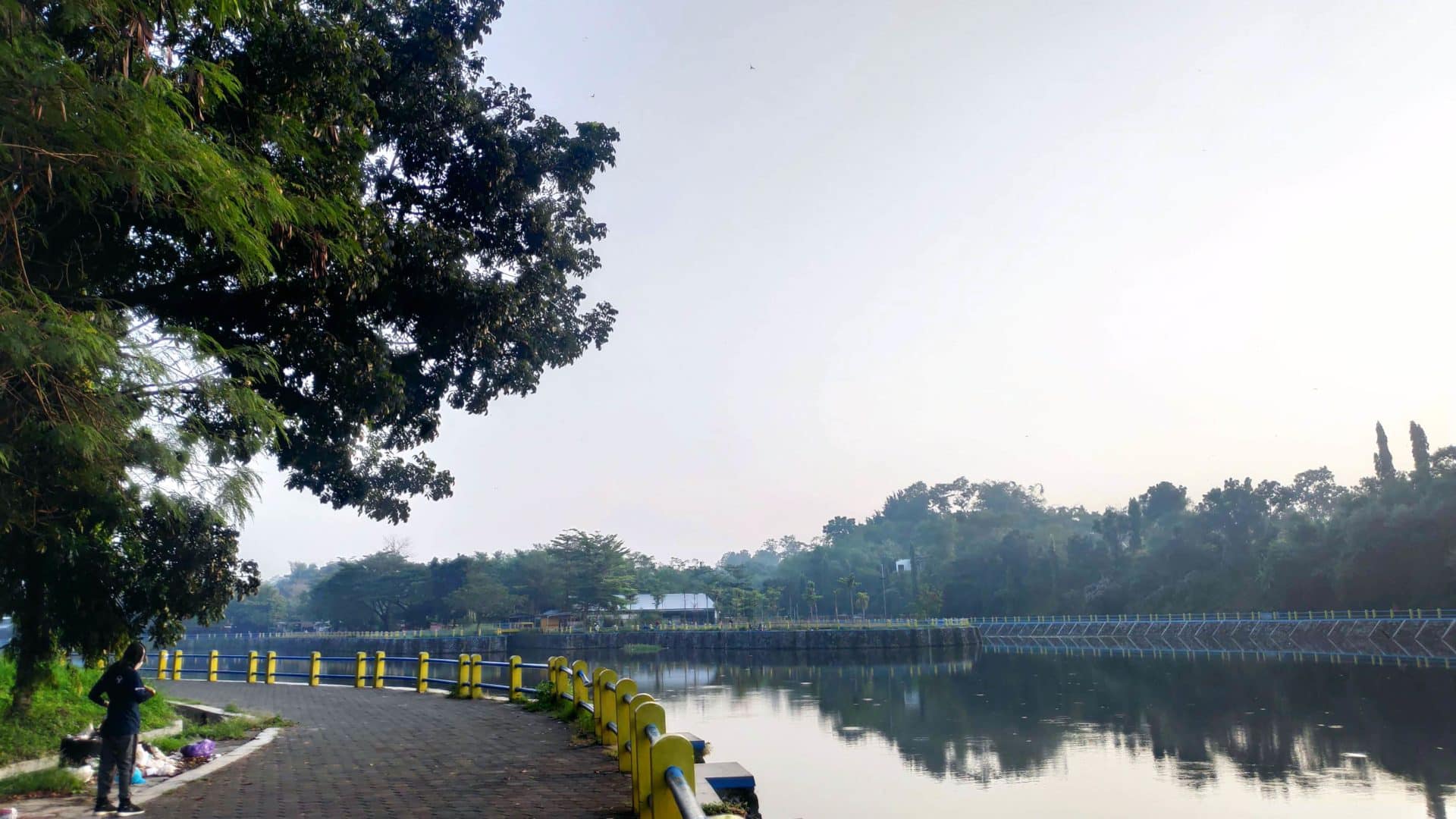
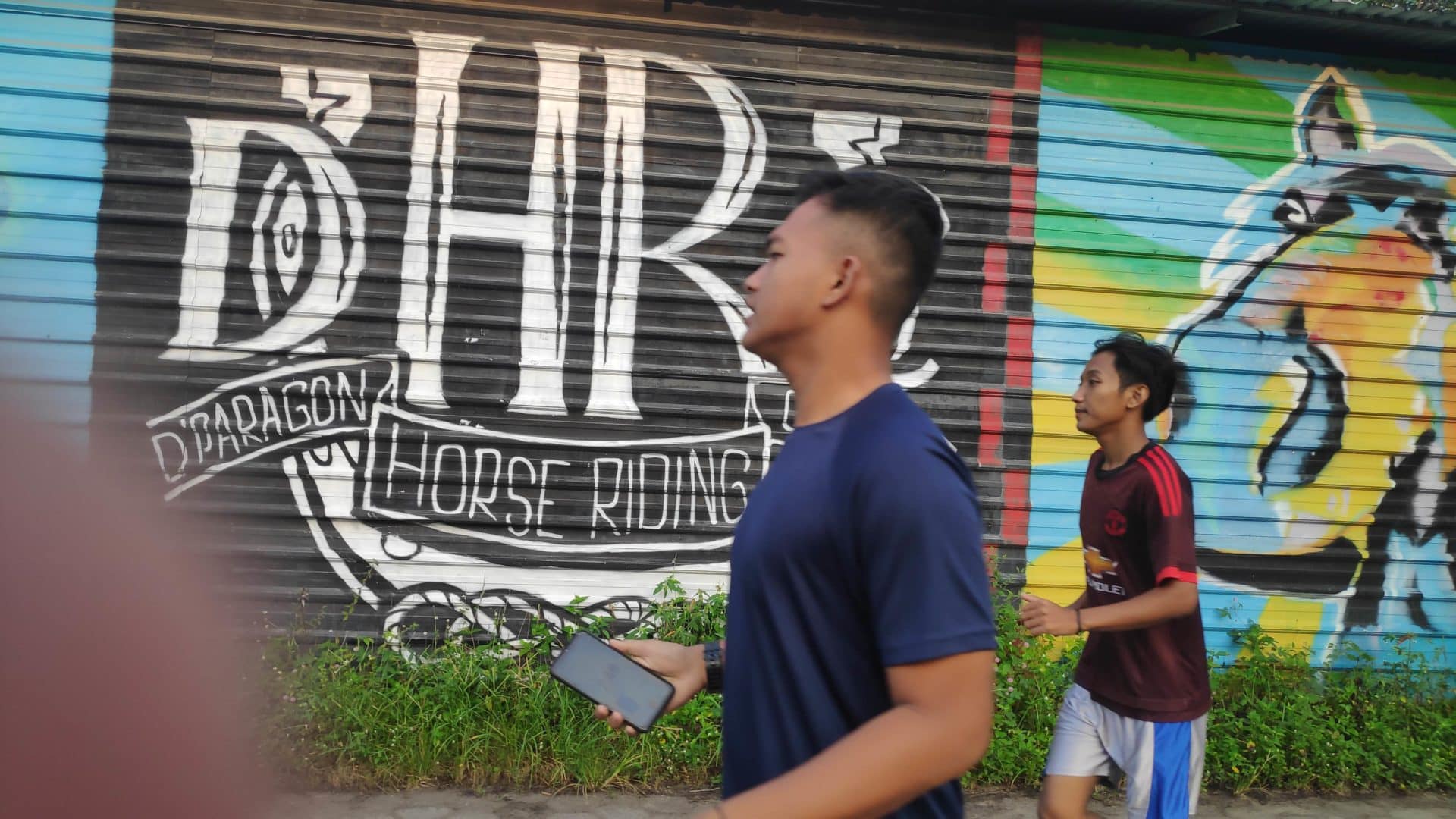
Green, shady, and cool – so it all looks from afar. But after many times going there, walking around and looking closely, I’ve became aware that all isn’t fine in this place. The long canals surrounding the basin are full of mud and plastic trash left behind by visitors. The trash just keeps growing, a lot of it simply ignored, not ever getting cleaned-up.
Fira says some of the trash has been there for five years. After this comes a quip: ‘More enduring than my last relationship’. She laughs and continues to walk.
In one section of the circuit, with the sharp cliff pressing in on one side, two dogs come out of some bushes and begin barking. We both panic. I think that maybe they’ve just had pups and are guarding them. Fira now appears out of breath, and makes attempts to hide her exhaustion.
We stop a minute and wait for the dogs to go away. Now a Vesper scooter comes towards us, emerging from a complex of buildings behind the reservoir. It’s a man, tall, thin, wearing shorts and a blue hat. We’ve seen him several times before, have passed him by on this path. He routinely appears every weekend. ‘Always the same clothes, always the same bike, and always in the same spot’, says Fira.
She really knows every corner of this place, all its inhabitants and all its routine visitors. Although she has lately had to reduce how often she exercises here since starting new work. Beforehand, her body was slimmer, her sleep came easier, and she was happier. ‘Now it’s really hard, she says.
Her eyes are red, and there are puffy bags under her eyes. She could only get to sleep at two o’clock last night, apparently, then woke up at five. Her insomnia’s worsening. I endeavour to invite her to exercise and walk partly because I’m worried about her. She said no to me several times recently before finally agreeing to come with me to Tambakboyo today.
‘You should get in the habit of coming here earlier in the morning’, she continues. ‘At dawn, when it’s cooler.’
For me, walking is a way of facing depression and diabetes. For Fira, walking is a way to fight insomnia. Both of us know many things need to be fixed before we start any new relationship. The traumas of disappointment, of being ghosted, and of exploitation make me always think long and hard when searching for a partner.
Now as we walk on we see a large building standing by itself on the north side of the reservoir. It’s a neglected horse-stable. There’s a wide yard surrounded by a wire fence, extending almost to the lake. In the middle of the yard is the building, horses lined-up in box-stalls inside. ‘They’re police horses, I think’ says Fira. ‘They used to get let out often’.
Fira has long straight black hair, reaching her waist, which I know she likes a lot. But it’s not because of her hair that I’m drawn to spend time with her. She’s got an eccentric sense of humour and likes to make fun of herself, including via a huge collection of self-deprecating depression memes. Another thing that I think makes Fira exceptional is that she accepts my depression, or at least I think that this is true.
I was diagnosed with depression at the end of 2017. During 2020 and 2021 I tried two times to kill myself. After moving from Jakarta to Yogya and finding a new psychologist at the University of Sanata Dharma, I became better. I also found a good job. Some people would refuse to think of it as a ‘real job’, but I really like it: I write for a technology company that has its office on the slopes of Mount Merapi. I can write amid a landscape that isn’t surrounded by concrete, you know? Every late afternoon I can gaze at ricefields close to the office; sometimes if I get into work early, a thin fog still blankets the road. Priceless experiences I never encountered when living in Jakarta.
But if you ask me, diabetes was the real factor in making me want to keep living. It’s funny, really – after years of being suicidal, the thing that made me want to keep going turned out to be this asshole of a disease.
‘I don’t want to die because of this stupid illness’, I tell Fira.
Yogyakarta has several reservoirs: Ketingan, Giwangan, Langensari. They’ve all become public spaces, providing a place to meet, to do activities – to breathe. Fira says Tambakboyo is her favourite because it’s close to the universities of UGM and UNY, it’s bigger, and its easily-accessed by car or bike. But I think what makes Tambakboyo exceptional is the waterfall at one end.
People often sit for hours in front of that waterfall, not doing anything. It’s nothing special, really, but seeing the water falling, hearing it crashing down, makes people want to linger. The effect is like meditation, I think. Even though, if you look at the water in the falls, you’ll see that it’s filthy, plastic bottles and plastic bags are floating around, there’s no beauty there.
‘You’re not bored of dating apps?’ I ask Fira. ‘What are you searching for?’
Fira doesn’t answer right away. I can’t see her expression because it’s covered by her mask. Walking in a mask is arguably a bad idea, but two years of the pandemic have made me shrewd at discerning facial expressions despite facial coverings. Fira’s the same way – despite our masks we manage to talk freely, not getting out-of-breath, succeeding in enjoying our walks around the reservoir.
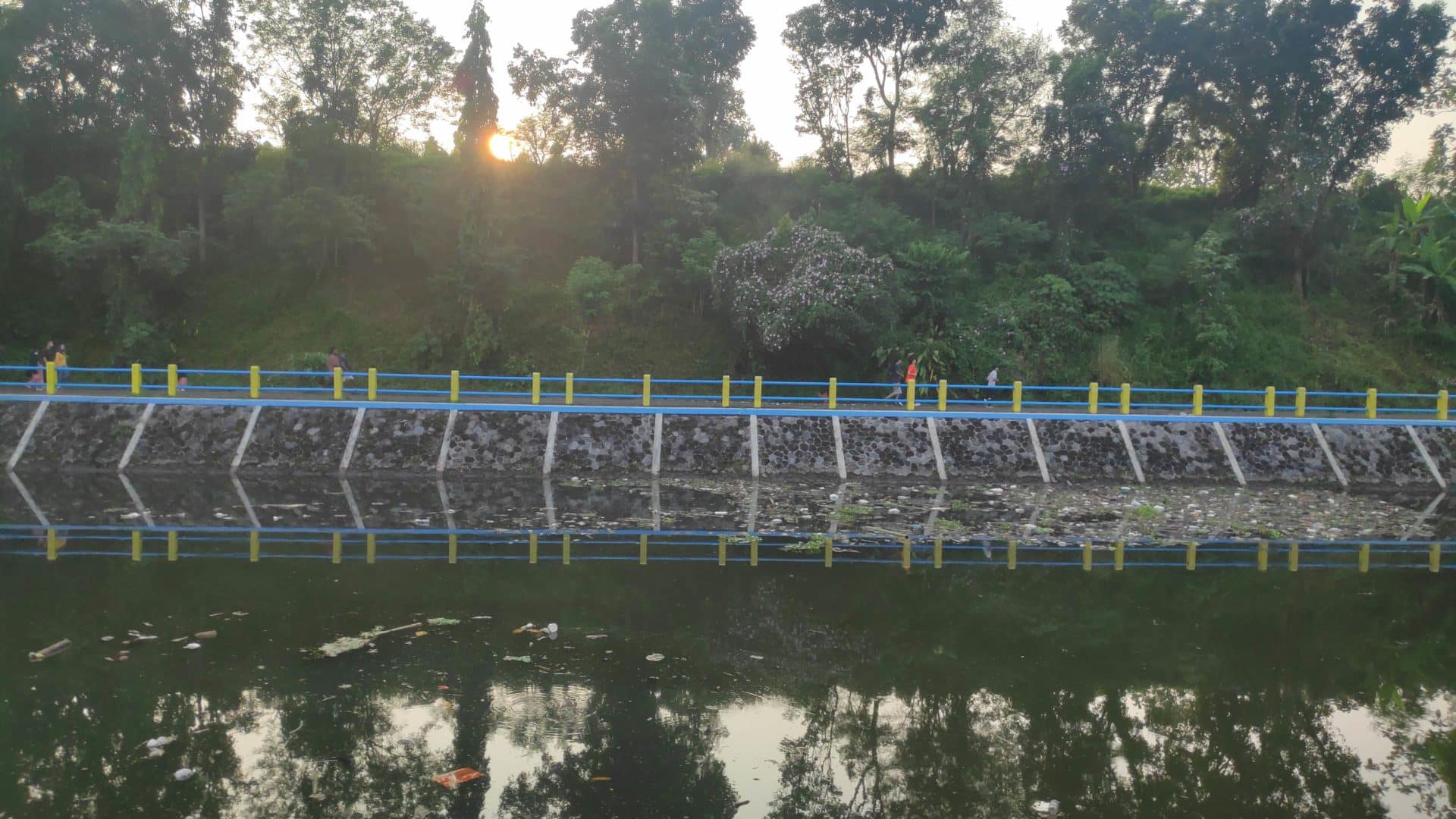
She’s sick of the dating apps, she confirms. She wants to meet someone serious, and would get married tomorrow if need be. I can sympathise with such unsettledness.
‘I don’t want to open up only to be disappointed again’, says Fira.
Something I’m well-aware of. And the pandemic has turned romance into a difficult thing. Physical touch, affection, and personal relations now come at high cost. Which in turn makes it easier to surrender to feelings of hopelessness and to reach out for some momentary satisfaction, leading to more distresses. I believe in Fira, and hopefully Fira believes in me. We each hope we can recover, from our trauma, from our illnesses.
Before the sun rises higher, we end our walk together around the reservoir. Beside each other, we head to the motorbike parking area. I open my bag, take out my jacket. I invite her to breakfast, but Fira turns me down, starts up her scooter. She says she wants to sleep. ‘I want to take a shower, then nap til lunchtime’. She’s tired, yet at the same time, she seems refreshed.
‘Soon we’ll walk again here, right?’ I say. ‘To sleep soundly’.
‘Can’t promise that’, says Fira.
© Arman Dhani
English translation © Lise Isles
